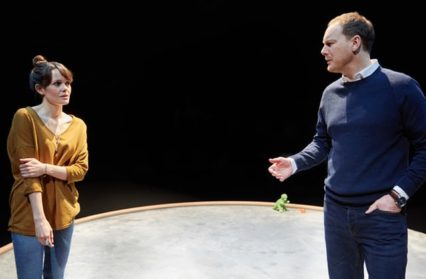Jafar Iqbal reviews Brad Birch’s Tremor, depicting two ex-lovers in a gladiatorial argument, which creates an emotionally charged performance.
Just under three years ago, a one-hander called Iphigenia in Splott premiered at Sherman Theatre’s studio space. Once teetering towards mediocrity, the venue found a calling card and a stability. Three years and three hallmark productions later, Gary Owen and Rachel O’Riordan stood on stage and collected what is perhaps the first Olivier Award ever won by a Welsh producing venue. Like everything in life theatre is cyclical and, on the eve of Iphigenia…’s anniversary, that same studio space plays host to Tremor. Sitting through Brad Birch’s two-hander, so raw and relevant, offers a pleasing reminder of those early Sophie Melville performances in 2015.
Birch’s characters don’t have Effie’s venom, though. Tom and Sophie, meeting after four years, are as close to diplomatic as former lovers can be. Though politics is central to how the story progresses, this is by no means a political play. Tremor is about the ways in which people cope with trauma, with our two leads representing two opposing mechanisms. They dance around Hayley Grindle’s beautifully simple stage like gladiators on a battlefield, cautiously jabbing one another with astutely written back-and-forth exchanges. As their coping shields start to falter, the tension ratchets up. Sounding at times like the ebbs and flows of a boiling kettle, Sam Jones’ piercing score fills the gaps that follow each major blow. Each blow get heavier, more painful, neither character wanting to concede defeat. It’s thrilling.
That nod to gladiatorial combat is smart direction, one of the many positives in an assured directorial effort from David Mercatali. It has its peaks and troughs, of course, but Tremor is essentially two people talking on stage for nigh-on seventy minutes. Mercatali subtly manipulates the world around this conversation, whether through the introduction of an ominous hum or the gradual changing of a light – minor adjustments that echo Tom and Sophie’s shifting dynamic.
Lisa Diveney and Paul Rattray are excellently cast as the ex-partners and deserve plaudits for giving such emotionally charged performances night after night. While the script eloquently vocalises the play’s themes, it’s the silences and the facial expressions that the audience react most strongly to. It’s as much about the actors’ ability and chemistry as it is about Mercatali’s command of the production. However, it’s that same subtlety which hampers the final sequence of the play. In trying to keep a big twist hidden as long as possible, the script fails to drop enough hints and makes the reveal far too sudden. The enormity of the moment is by no means diminished, but Birch is asking the audience to make one leap too many.
Funnily enough, having a jarring ending was a criticism levelled in 2015, but that minor qualm didn’t hurt Iphigenia… in any way, and it doesn’t hurt Tremor. Birch has written an extremely balanced and thought-provoking script, and Mercatali has moulded it into must-watch theatre. Like everything in life, theatre is cyclical. Perhaps it’s coincidental, but there is something telling in the fact that, three years after Owen, a working-class Welsh writer has a work of such substance and relevance on the Sherman studio stage. There is something telling in the fact that David Mercatali, like O’Riordan in 2015, takes on powerful subject matter with such keen dexterity. Both plays deal with topics that are frighteningly relevant, with endings that leave the audience talking long after the show finishes. It seems like a torch has been passed, for the cycle to continue.
You might also like…
Directed by Sherman Cymru’s Rachel O’Riordan, Iphigenia in Splott is an undeniably powerful piece of theatre, interlacing exceptional writing and phenomenal acting to create a world and character that will break your heart.
Jafar Iqbal is a regular contributor to Wales Arts Review.












